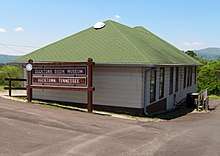Ducktown Basin Museum
The Ducktown Basin Museum is a history museum and heritage center in Ducktown, Tennessee that chronicles the history of copper mining activities in the Copper Basin, a geological region in Polk County, Tennessee. The museum is located adjacent to the Burra Burra Mine, which was the most productive mine in the basin.
 | |
| Established | 1978 |
|---|---|
| Location | 212 Burra Burra Street Ducktown, Tennessee, United States |
| Coordinates | 35°02′08″N 84°22′43″W |
| Type | History museum, heritage center |
| Owner | Ducktown Basin Museum |
| Website | www |
History
The Copper Basin, also known as the Ducktown Basin, is a geological located mostly within Polk County, Tennessee which contains extensive deposits of copper ore, as well as many other minerals. Copper from the basin was extensively mined between 1847 and 1987.[1] Mining activities began to decline in the mid-1950s, and in 1978, the museum was established by a group of local citizens intent on preserving the heritage of the mining activities in the basin. Initially, the museum was located on Main Street in Ducktown. In 1982, the museum was moved to its present location.[2] The adjacent Burra Burra Mine was placed on the National Register of Historic Places (NRHP) the following year.[3]
Exhibits
The museum is located in a building that formerly served as the headquarters of the Tennessee Copper Company, one of the major entities that operated mines in the basin. This site, jointly known as the Ducktown Basin Museum & Burra Burra Mine State Historic Site, is owned by the Tennessee Historical Commission, and consists of 10 buildings on 17 acres.[4] The first exhibit in the museum is a geological history of the Copper Basin. This is followed by several exhibits about the history of the mining and sulfuric acid production activities in the basin, as well as the lives of the miners and residents of the mining towns in the basin. Many artifacts from the mining activities are included in the exhibits. The museum also includes an exhibit about the environmental problems that resulted from the mining activities in the basin, and the subsequent cleanup and restoration efforts.[5]
References
- Cochran, Kim. "Minerals and Mining of the Copper Basin". gamineral.org. Georgia Mineral Society. Retrieved 2008-05-30.
- "Remembering the golden age of copper". ducktownbasinmuseum.com. Ducktown Basin Museum. Retrieved 2020-04-25.
- "National Register Information System – Burra Burra Mine (#83003059)". National Register of Historic Places. National Park Service. November 2, 2013. Retrieved February 29, 2020.
- "Ducktown Basin Museum & Burra Burra Mine State Historic Site". tn.gov. Tennessee Department of Environment and Conservation. September 10, 2019. Retrieved 2020-04-25.
- "Exhibits". ducktownbasinmuseum.com. Ducktown Basin Museum. Retrieved 2020-02-29.